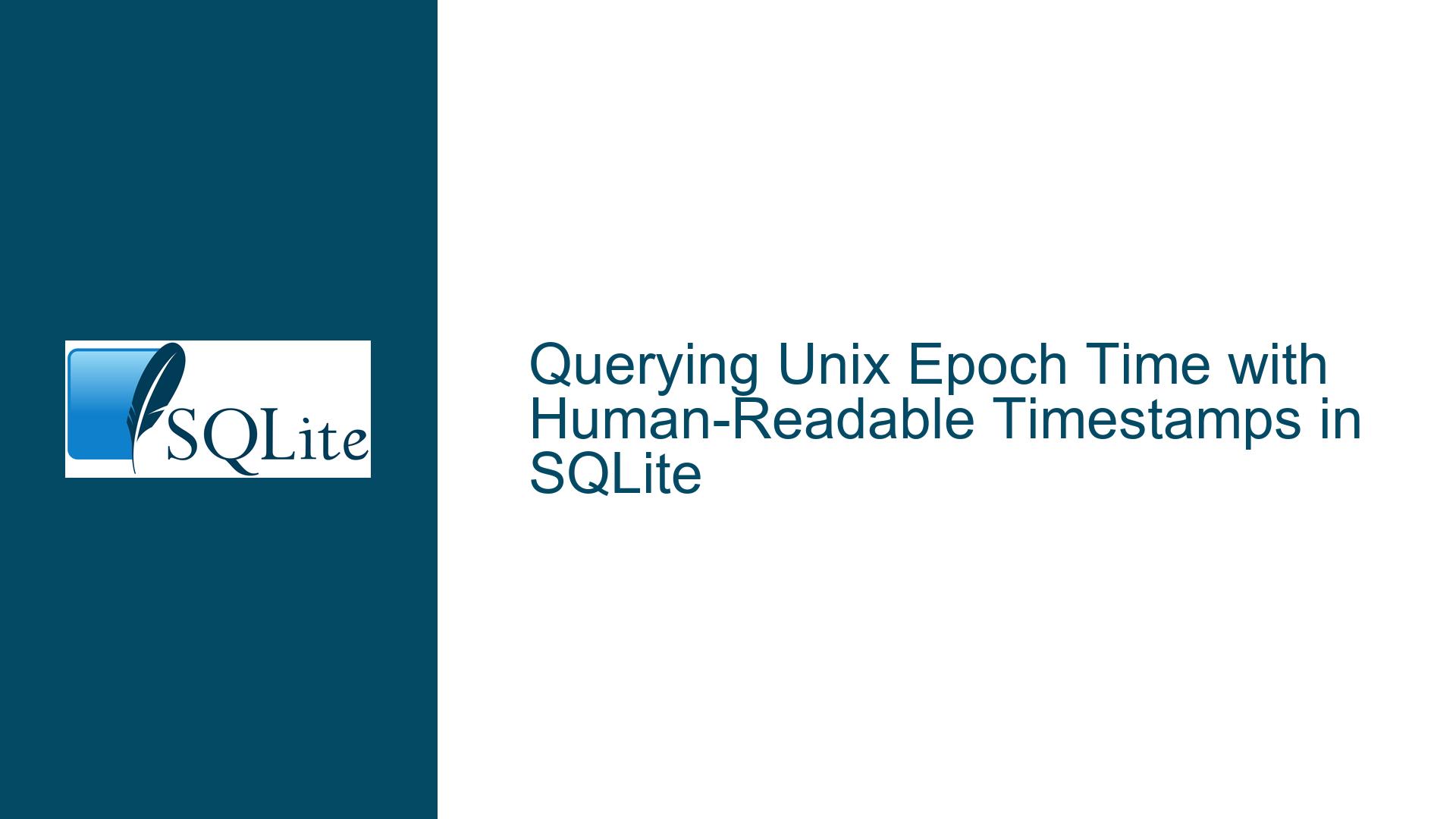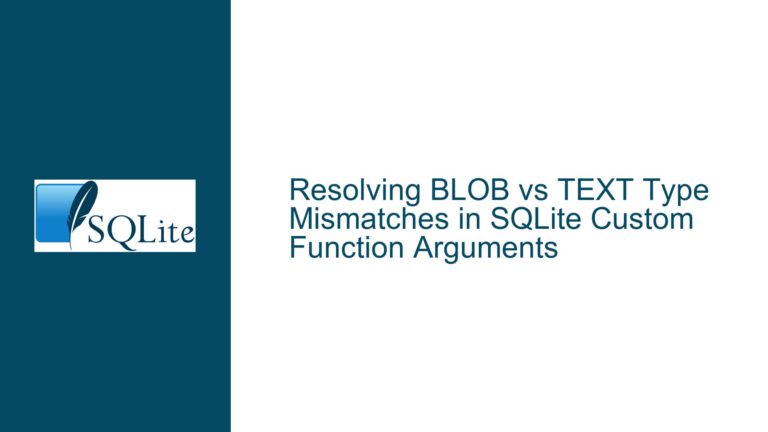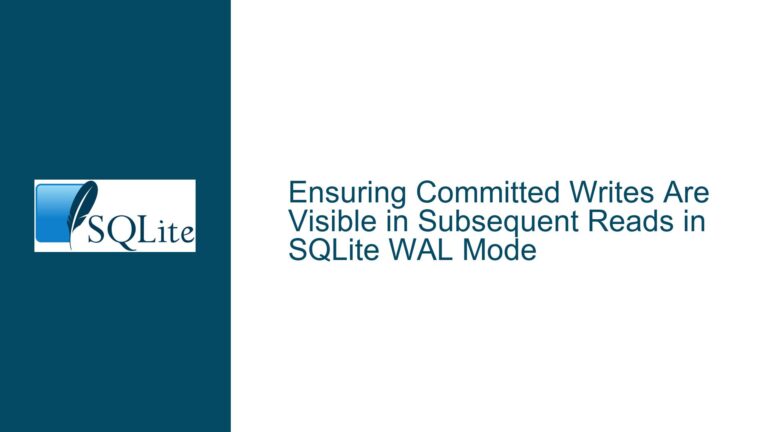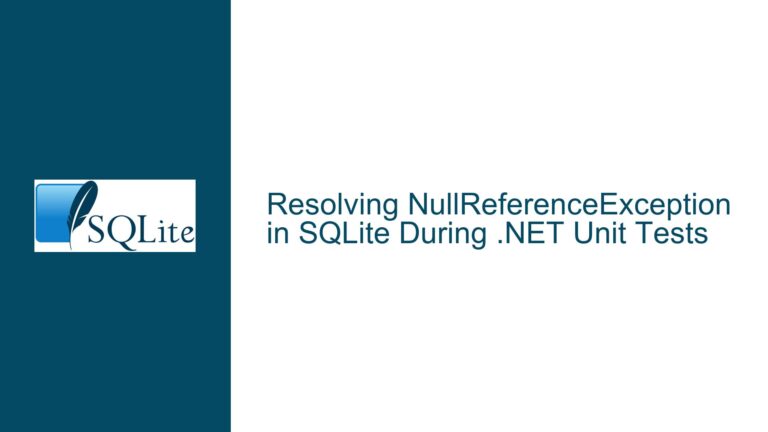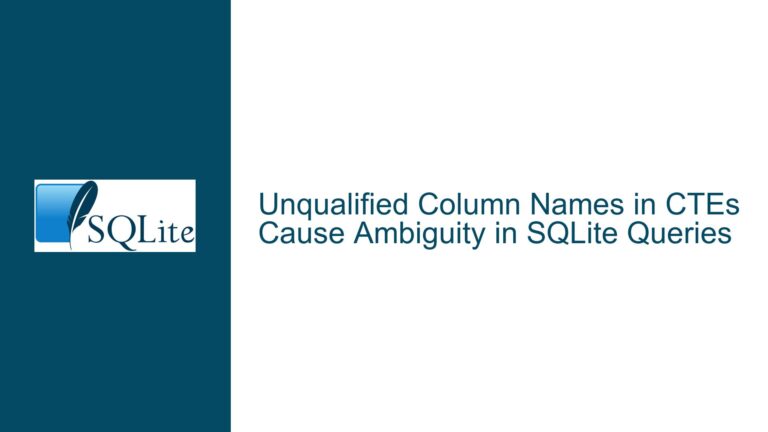Querying Unix Epoch Time with Human-Readable Timestamps in SQLite
Understanding Timestamp Conversions in SQLite Queries
Core Challenge: Filtering Unix Epoch Data Using Human-Readable Time Ranges
The fundamental challenge revolves around querying a SQLite database where timestamps are stored as Unix epoch integers while allowing developers to use human-readable datetime formats (e.g., ‘2023-12-15 00:00:30’) in their WHERE clauses. This requires bidirectional conversion between epoch time and formatted datetime strings while maintaining query efficiency and correctness. The database schema uses an INTEGER column (dateTime) to store epoch timestamps, and the user wants to avoid manually converting input values to epoch time through nested function calls like strftime('%s', ...).
Three critical factors compound the problem:
- Temporal Context Awareness: The requirement to handle local time conversions (via the
'localtime'modifier) while ensuring the base storage remains in UTC or epoch format - SQLite Version Constraints: The use of SQLite 3.32.3, which lacks the
unixepoch()function introduced in v3.38.0 - Column Naming Ambiguity: A
dateTimecolumn storing epoch integers conflicting with SQLite’s built-indatetime()function, leading to confusion in function/column references
Root Causes of Conversion Failures and Performance Issues
1. Function Availability and Version Limitations
SQLite’s datetime handling functions evolved significantly between v3.32.3 (2020-05-22) and v3.38.0 (2022-02-22). The absence of unixepoch() forces developers to use workarounds involving strftime('%s', ...) for datetime-to-epoch conversion. However, this approach becomes unwieldy when dealing with timezone adjustments and range comparisons.
2. Timezone Handling Pitfalls
When converting epoch timestamps to local time using datetime(dateTime, 'unixepoch', 'localtime'), the modifier order matters. The 'localtime' modifier must follow 'unixepoch' to correctly adjust the base UTC timestamp to the local timezone. Omitting this sequence or misplacing modifiers leads to incorrect time displays and faulty WHERE clause comparisons.
3. Index Utilization Breakdown
Applying functions to indexed columns (e.g., WHERE datetime(dateTime, 'unixepoch', 'localtime') BETWEEN ...) prevents SQLite from using indexes on the dateTime column. This forces full table scans, causing performance degradation on large tables. The column-vs-function name conflict (dateTime column vs. datetime() function) exacerbates readability issues and potential errors.
4. Precision Mismatches in Date/Time Functions
Using date() instead of datetime() for conversions truncates temporal precision to day granularity. A WHERE clause filtering with date() would exclude all records except those exactly at midnight, while datetime() preserves hour/minute/second details. This explains why the original query showed only dates without times when using date(dateTime, ...).
Comprehensive Solutions for Reliable Temporal Queries
1. Correct Conversion Pattern for Legacy SQLite Versions
For SQLite <3.38.0, use this WHERE clause pattern to convert human-readable inputs to epoch time:
SELECT dateTime, datetime(dateTime, 'unixepoch', 'localtime') AS local_dt, rain
FROM archive
WHERE dateTime BETWEEN strftime('%s', '2023-12-03 00:00:30', '-2 hours')
AND strftime('%s', '2023-12-03 23:58:30', '-2 hours');
Key Components:
strftime('%s', ...)converts input strings to epoch integers- The
'-2 hours'modifier adjusts for timezone offsets before conversion - Comparison operates directly on the indexed
dateTimecolumn
2. Timezone-Aware Column Aliasing
To avoid repeating the conversion logic while maintaining index usage:
SELECT dateTime, datetime(dateTime, 'unixepoch', 'localtime') AS local_dt, rain
FROM archive
WHERE dateTime BETWEEN (
SELECT strftime('%s', '2023-12-03 00:00:30', '-2 hours')
) AND (
SELECT strftime('%s', '2023-12-03 23:58:30', '-2 hours')
);
This uses subqueries to calculate the epoch boundaries once, improving readability without sacrificing performance.
3. Handling Daylight Saving Time and Zone Changes
When historical data spans DST transitions, use UTC for storage and convert to local time only in queries:
-- Store UTC epoch times
-- Convert to local time during selection:
SELECT datetime(dateTime, 'unixepoch', 'localtime'), rain
FROM archive
WHERE dateTime BETWEEN strftime('%s', '2023-12-03 00:00:30', 'utc')
AND strftime('%s', '2023-12-03 23:58:30', 'utc');
The 'utc' modifier ensures input datetime strings are interpreted as UTC before conversion to epoch time.
4. Mitigating Index Scan Penalties
For tables where epoch-range queries are frequent, create a virtual column using generated always:
ALTER TABLE archive ADD COLUMN local_dt TEXT GENERATED ALWAYS AS (
datetime(dateTime, 'unixepoch', 'localtime')
);
CREATE INDEX idx_archive_local_dt ON archive(local_dt);
Now query directly on the virtual column:
SELECT dateTime, local_dt, rain
FROM archive
WHERE local_dt BETWEEN '2023-12-03 00:00:30' AND '2023-12-03 23:58:30';
Caution: Generated columns consume storage space and require SQLite 3.31.0+. Test performance as virtual columns may not always use indexes efficiently.
5. Bridging the Version Gap with Custom Functions
For environments where SQLite upgrades are impossible (e.g., legacy ARMv6 systems), register a user-defined function to replicate unixepoch():
// C extension example
#include <sqlite3ext.h>
SQLITE_EXTENSION_INIT1
static void unixepochFunc(
sqlite3_context *context,
int argc,
sqlite3_value **argv
){
const char *zIn = (const char*)sqlite3_value_text(argv[0]);
sqlite3_int64 iOut;
// Parse zIn as datetime string and convert to epoch
// (Implement actual parsing logic here)
sqlite3_result_int64(context, iOut);
}
int sqlite3_extension_init(
sqlite3 *db,
char **pzErrMsg,
const sqlite3_api_routines *pApi
){
SQLITE_EXTENSION_INIT2(pApi);
sqlite3_create_function(db, "unixepoch", 1, SQLITE_UTF8, 0,
unixepochFunc, 0, 0);
return SQLITE_OK;
}
Compile as a loadable extension and use like native functions:
SELECT dateTime, datetime(dateTime, 'unixepoch', 'localtime'), rain
FROM archive
WHERE dateTime BETWEEN unixepoch('2023-12-03 00:00:30')
AND unixepoch('2023-12-03 23:58:30');
6. Precision-Controlled Comparisons for Edge Cases
When querying across daylight saving time boundaries or leap seconds, use closed-open intervals:
WHERE dateTime >= strftime('%s', '2023-12-03 00:00:30', '-2 hours')
AND dateTime < strftime('%s', '2023-12-04 00:00:00', '-2 hours')
This avoids missing records due to second-precision gaps at interval endpoints.
7. Cross-Platform Timezone Validation
To ensure consistent timezone handling across different systems:
-- Check SQLite's current timezone assumptions:
SELECT datetime('now', 'localtime') AS local_now,
datetime('now') AS utc_now;
If discrepancies arise, set the SQLite runtime environment’s timezone before opening the database connection:
export TZ='Europe/London'; ./your_application
8. Schema Design Recommendations for New Projects
For future-proofing temporal data storage:
- Store all timestamps as INTEGER (epoch seconds) or REAL (Julian day numbers)
- Include a metadata table recording timezone details:
CREATE TABLE db_time_info (
key TEXT PRIMARY KEY,
value TEXT
);
INSERT INTO db_time_info VALUES
('timezone', 'Europe/London'),
('epoch_base', 'unix'),
('daylight_saving', 'auto');
9. Query Optimization through Partial Indexing
When querying specific date ranges regularly, create partial indexes:
CREATE INDEX idx_archive_2023_12 ON archive(dateTime)
WHERE dateTime BETWEEN strftime('%s', '2023-12-01')
AND strftime('%s', '2024-01-01');
SQLite’s query planner will automatically use this index for queries within December 2023.
10. Temporal Data Validation Suite
Implement check constraints and validation queries:
-- Ensure stored epoch times are within reasonable bounds
ALTER TABLE archive ADD CHECK (dateTime BETWEEN 631152000 /*2000-01-01*/
AND 2524608000 /*2050-01-01*/);
-- Periodic validation of time conversions
SELECT
dateTime AS stored_epoch,
datetime(dateTime, 'unixepoch', 'localtime') AS converted_local,
strftime('%s', datetime(dateTime, 'unixepoch', 'localtime')) AS roundtrip_epoch
FROM archive
WHERE roundtrip_epoch != dateTime
LIMIT 10;
This identifies conversion mismatches indicating improper timezone handling or invalid epoch values.
Final Implementation Checklist
- Verify SQLite version using
sqlite3_version()orSELECT sqlite_version() - For versions <3.38.0, use
strftime('%s', ...)with explicit timezone modifiers - Apply conversion functions only to input parameters, not to the
dateTimecolumn - Use column aliases to simplify repetitive datetime conversions in SELECT
- Test index usage with
EXPLAIN QUERY PLANbefore and after query modifications - Validate timezone consistency between application code and database environment
- Consider pre-computing frequently queried temporal ranges in materialized views
By methodically applying these techniques, developers can achieve accurate, efficient temporal queries against Unix epoch-stored timestamps while maintaining compatibility with older SQLite versions. The solutions balance immediate workarounds for legacy systems with forward-looking schema designs that accommodate future upgrades.
